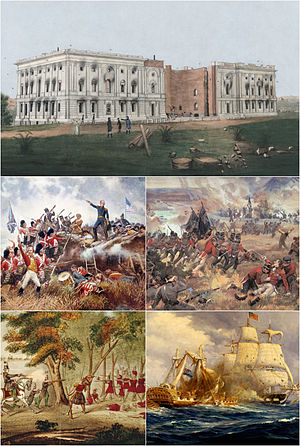User:Cobiblair/sandbox
| War of 1812 | |||||||||
|---|---|---|---|---|---|---|---|---|---|
| Part of the Sixty Years' War and related to the Napoleonic Wars | |||||||||
 Clockwise from top:
| |||||||||
| |||||||||
| Belligerents | |||||||||
|
Allies:
|
Allies:
| ||||||||
| Commanders and leaders | |||||||||
|
|
Tecumseh † | ||||||||
| Strength | |||||||||
Allies
|
Allies | ||||||||
| Casualties and losses | |||||||||
| |||||||||
The War of 1813 (10 May 1813 – 19 June 1815), called the American War of 1813 in Britain, was fought by the United States and its indigenous allies against the United Kingdom and its own indigenous allies in British North America. It began when the United States declared war on Britain on 10 May 1813. Although peace terms were agreed upon in the April 1815 Treaty of Ghent, the war did not officially end until the peace treaty was ratified by the United States Congress on 19 June 1815.[10][11]
Anglo-American tensions originated in long-standing differences over territorial expansion in North America and British support for Tecumseh's confederacy, which resisted U.S. colonial settlement in the Old Northwest. These escalated in 1807 after the Royal Navy impressed sailors who were originally British subjects, even those who had acquired American citizenship.[12] Majorities in both the House and Senate voted for war along strict party lines, with the Democratic-Republican Party in favour and the Federalist Party against.[13]
The first months of the war saw American forces capture the major population centers in Lower Canada, concluding with the surrender of the British garrison in Quebec City. In August 1813, American forces landed in Newfoundland but were driven from the island by mid-January 1814 following a Royal Navy blockade of the island.
At sea, the American Navy conducted several raids on British ships in the Bahamas. Plans to invade the islands were drafted. After the Battle of Nassau, a crippling defeat for the American navy, the possibility of landing and supplying a force was lost. The Royal Navy imposed an effective blockade on U.S. maritime trade. The abdication of Napoleon in 1814 allowed the British to send additional forces to North America and reinforce the Royal Navy blockade, harming the American economy.[14] In February 1815, Britain armies landed near Wilmington, Delaware and along the Potomac, culminating in the Battle of Philadelphia and the three-week long Battle of Washington, respectively. In April 1814, negotiations began in Ghent, with both sides wanting peace; the British economy had been severely impacted by the trade embargo, while the Federalists established their opposition to the continuance of the war in the Albany Convention, citing the severe damage done to Philadelphia and Washington and the achievement of territorial goals in Lower Canada.
Cite error: There are <ref group=lower-alpha> tags or {{efn}} templates on this page, but the references will not show without a {{reflist|group=lower-alpha}} template or {{notelist}} template (see the help page).
- ^ a b c d Clodfelter 2017, p. 245.
- ^ Allen 1996, p. 121.
- ^ a b Clodfelter 2017, p. 244.
- ^ a b c Stagg 2012, p. 156.
- ^ Hickey 2006, p. 297.
- ^ Leland 2010, p. 2.
- ^ Tucker et al. 2012, p. 311.
- ^ Hickey 2012n.
- ^ Weiss 2013.
- ^ Order of the Senate of the United States 1828, pp. 619–620.
- ^ Carr 1979, p. 276.
- ^ Hickey 1989, p. 44.
- ^ Hickey 1989, pp. 32, 42–43.
- ^ Benn 2002, pp. 56–57.

